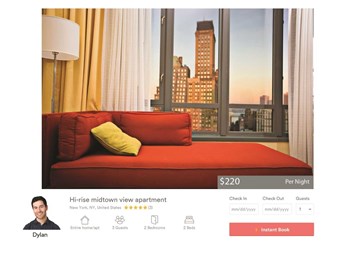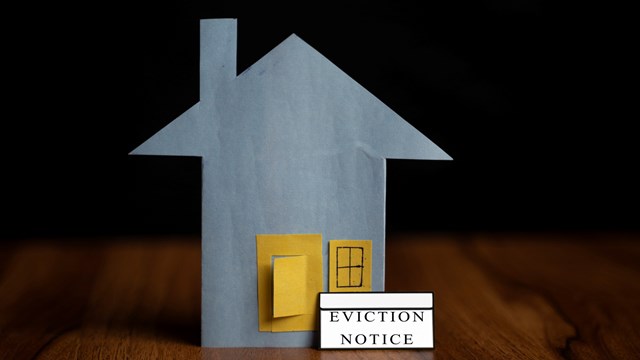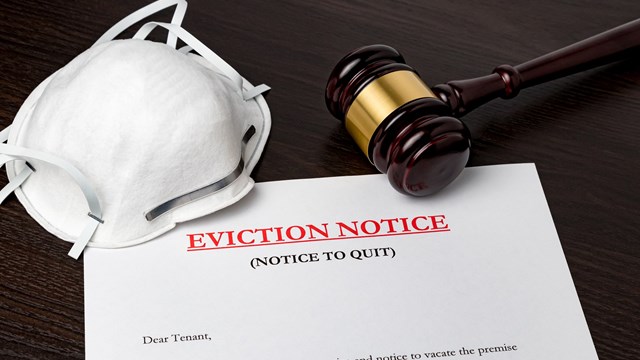
The media and political buzz surrounding so-called 'homeshare' or 'short-term rental' websites (primarily Airbnb, but also other similar services like Homeaway.com and VRBO.com, just to name two) has been on the upswing over the last year or so. It sounds like a perfect arrangement; You go on vacation, and rent out your home while you’re gone—you get a house sitter who pays real money, instead of the other way round.
Or, you stay home, and rent out your spare room—making a few hundred (or even a few thousand) dollars without doing anything more than washing your extra set of sheets and wiping down the counters. It’s all part of a growing trend called homesharing, which is taking so-called 'destination cities' by storm.
An Ideal Idea?
Homesharing is especially popular—and controversial—in New York, where rents are ridiculously high, and New Yorkers are taking advantage of how much people are willing to spend by renting out their own places whenever they can. In the Big Apple, you can rent everything from a sunny room in Bushwick, Brooklyn for $63 a night to a sprawling 5,200 square-foot, six bedroom, seven bathroom luxury townhouse with a private garage on the Upper East Side for a cool $1,333 per night. Indeed, for renters and for those doing the renting, when it comes to homesharing, the sky's the limit in terms of what you can get for your money, and how much cash you can make.
But while thousands of apartment owners in cities like Chicago, New York, Boston and San Francisco love being able to monetize their units by renting an extra bedroom (or even their whole place, if they're out of town) to a visitor or tourist, condo and HOA boards and management are typically less enthused about the trend. A constant stream of non-resident visitors raises security concerns, adds wear-and-tear to common areas, and complicates the enforcement of house rules. Depending on the city, short-term rentals may also run afoul of zoning and hospitality laws.
Homeshare History...and the Law
The biggest player currently in the homesharing game is without question San Francisco-based Airbnb Inc. Founded in 2008, the service allows anyone to list their house, condo, spare room, couch, boat, treehouse or any other living area for short-term rental. More than 9 million people in 34,000 cities have checked out Airbnb—with more than 500,000 listings across the world—so this trend is certainly not shrinking or going away.
In fact, according to the company, on December 31st, Airbnb had its biggest night in history of the company, with nearly 550,000 travelers using the company to stay in more than 190 countries. Of those, 91,000 were guests using Airbnb for the first time, and 22,000 hosts were new, too. That’s compared with five years ago, when only 2,000 people used Airbnb on New Year’s Eve.
While the homesharing trend is no doubt massive, in many instances, it's also downright illegal. A 2010 New York State law shows that renting out an apartment for fewer than 30 days is illegal, which makes 60 percent of the apartments on Airbnb—or more than 15,000—illegal, according to Share Better, which is an anti-Airbnb coalition. And it gets worse: According to New York Attorney General Eric Schneiderman, as many as 72 percent of Airbnb reservations are illegal.
If homesharers get caught, the penalties are severe, says Adam Leitman Bailey, real estate attorney and founder of Adam Leitman Bailey, P.C., based in Manhattan. Bailey has been involved with more than 100 cases concerning homesharing within the past year, and says 'hosts'—unit owners or tenants who rent out their apartments to short-stay visitors—can incur penalties of up to $1,000 per day—and, he says, because it’s so difficult to do this legally, chances are that most people who host are in violation.
“Even if they have a lease for more than 30 days, they need commercial insurance, which is very expensive, and many insurance companies won’t give you commercial insurance,” he says. “You may be violating your lease by using your unit as a business because almost all co-ops ban subletting.”
Popular...But Not Really OK
The popularity of homesharing is matched only by backlash against it. Last year, illegal hotel complaints―like Airbnb and other short-term rental places—increased 62 percent.
Still, it’s all about the money, and Airbnb is big business. A report from Attorney General Eric Schneiderman found that 6 percent of the hosts were responsible for 36 percent of private bookings that were worth a whopping $168 million—or 37 percent of the revenue.
It doesn’t look like they’ll stop any time soon but the government is catching on.
Up until February 15th of this year, Airbnb was blamed for not collecting hotel taxes from many of its hosts – and for essentially allowing its members to use their apartments as ad hoc hotels, taking away business from real, legal hotel businesses. Last year, Airbnb began collecting taxes in San Francisco, Portland and California, and they’re extending the practice to more cities, including Chicago and Washington.
In January of this year, a New York City housing court judge evicted a rent-stabilized tenant for using Airbnb to profit off of his rental while he and his family were living elsewhere. It is the first recorded case of someone being evicted for using the service.
Legal or not, lots of people are using Airbnb and similar vacation rental services, regardless of whether or not they own their own building, own their own unit or just rent.
Most are doing it because this is such a lucrative and seemingly easy way of making money. Still, John LaGumina, a partner in the LaGumina Law Firm based, based in Purchase, warns that before anyone even thinks about homesharing, they need to see if their proprietary lease allows them to do this.
In a co-op, he says, it’s problematic to say the least. In a condo, it would depend on what the bylaws say (though anything rented would have to meet or exceed the 30-day minimum, according to New York state law, which most Airbnb renters are not interested in doing).
“You have some significant hurdles,” LaGumina says. “As a unit owner who wants to do this, keeping in mind that it’s probably in violation of the New York state law, not to mention your condo bylaws—if you’re still going to go ahead with this—you should do some things to make it safer.”
For example, LaGumina recommends starting with taking photos ahead of time to show the condition of the condo, so if any damage is done, you have grounds to prove that it was done by the person renting the apartment. You should also do a walk-through with the renter and an inspection, and get a legal agreement to require the tenant to return the home in the shape that it’s given in. There should also be a small security deposit, LaGumina says. “If this was actually a legal thing to do, I would treat it the same way I would treat any rental,” he says. “But homesharing just isn’t a good idea, you’re running too many risks. For the income you’re getting, is it worth running the risk?”
LaGumina says that between the of physical damage to their unit and its contents, and the possibility of being fined thousands of dollars, homesharing hosts may wind up losing a lot of money in the long run.
Neverthelss,new york , says that people are still probably taking those risks. His building does permit 30-day leases, but doesn’t allow anything shorter than that. However, he says that short of checking everyone who enters the building, it’s difficult to discern whether someone is using Airbnb.
“No one would advertise it, so you would never know,” he says. “It probably has happened here, but who knows?”
Sandy Adelsberg, a sales and leasing agent with Veritas Property Management in Manhattan, says that her company doesn’t allow homesharing or short-term leasing, but she also says that in small buildings, it’s very hard to tell whether someone is doing it. She recently took over a building and was looking over some old violations, and she noticed that a tenant had contacted the city’s Housing Preservation and Development (HPD) office because a rent-stabilized tenant was trying to make money on his apartment by subleasing it this way. “There are many reasons why it’s a bad idea,” she says, echoing the attorneys’ sentiments regarding risk to property, insurance issues, and rent control regulations.
Adelsberg spells it out plainly: by renting out their unit—whether condo, co-op, or rental—or even just a bedroom via Airbnb or some other homesharing company, a resident can potentially cover their rent or common charges, and make a tidy profit as well. That’s why the concept is so successful, and that’s why so many New Yorkers are willing to take such a huge risk by letting strangers live with them, or occupy their home in the host’s absence.
If You Insist…
Bailey says that there are a few ways to stop homesharing in your building if you don’t want it to occur. If you see people constantly coming in and out of a given apartment with suitcases, then that’s a sure sign that the owner or legal tenant is renting via a homesharing company.
“If you’re on a board and want to stop Airbnb, you should stop people from going upstairs,” Bailey continues. “Don’t let strangers go into the building unless the owner is there.” Bailey does admit that “If they say they’re a cousin or an uncle, however, it gets fuzzier.”
Undesirable as homesharing may be for a condo or co-op building, the reasons why owners participate in it can be just as serious. Perhaps the person doing the renting is desperate because they’ve lost their job, or just had some other huge or unexpected expense.
“They’re unable to pay their bills, and homesharing allows them to pay their mortgage,” Bailey says.
In an expensive city, that’s very compelling but the last reason to forbid homesharing in a co-op or a condo, and to eschew the practice as an owner, is that on top of the possible $1,000-a-day fine, the person renting out their apartment can get evicted and foreclosed because they could be violating terms of their lease, Bailey says. “I have tons of cases like this,” he says. “It’s huge.”
And it’s not going away any time soon.
Danielle Braff is a Chicago-based freelance writer and a frequent contributor to The Cooperator.






Leave a Comment